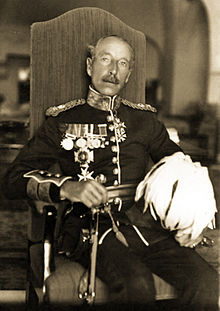History of the Maccabiah Games
| Maccabiah Games |
|---|
 |
| Main topics |
|
| Most recent games |
| Stadiums |
|
|
The History of the
History
At the end of the 19th century, Jews in Europe weren't allowed to take part in official athletic competitions and were forbidden membership in sports associations.
With the start of
Coincidentally, at about the same time, the
Approval of the Games & the Motorbikes Tour

The Maccabiah, could not take place without the approval of the
With the news of Wauchope's approval of the games, two separate delegations of Jewish motor-bikers set off from Tel Aviv on a promotional tour to the Jewish communities across Europe, where the vast number of Jews were living at the time. In 1930, one delegation left Tel Aviv to Antwerp, Belgium.[5][2] A year later a second delegation left Tel Aviv for London. Yekutieli also toured with that delegation. On a second tour, May 10 through July 16, 1931, the intrepid band of Maccabiah bikers covered roughly 5,825 miles (9,375 kilometers) from Tel Aviv to Egypt and through a ship to many of the big cities in Europe including Nuremberg, Paris, and London. At the end of the tour, the group returned to Israel via Beirut.[2][5]
The Maccabiada

The 1st Maccabiah opened on March 28, 1932.[10][9][3] The Games were nicknamed "White Horse Olympics" because Tel Aviv's Mayor Meir Dizengoff led a parade honoring the Games through the city streets while riding a white horse.[11][12] During these first games 390 sportsmen took part from 18 countries.[10][9] The games included everything from swimming, football, and handball, to various athletics. The games were regarded as a great success and planning for its successor were already on their way by the end of that year.[12]
Olympic Committee & 2nd Maccabiah
With the success of the first games, in 1933, with the help of Maccabi, Yekutieli founded the Palestine Olympic Committee which later became the
The second Maccabiah were held on from April 2 to 10, 1935 despite official opposition by the British Mandatory government.
3rd Maccabiah


Following the success of the 2nd Maccabiah, the 3rd Maccabiah was originally scheduled to be held in sprint of 1938.
It was not until 1950 that the games were renewed. The 3rd Maccabah took place during the
4th Maccabiah to present day
The fourth Maccabiah took place during Sukkot of 1953. The games ballooned to almost 2000 athletes from over 20 countries. Following the 4th Maccabiah, it was decided that the Maccabiah be held every four years like the Olympics to gain an olympic recognition. The games were then changed to take place quadrennially on the year following the Olympics - a change that's been in effect ever since.
The most recent games, the 21st Maccabiah took place between July 12 to 26, 2022.
The Maccabiah and the Aliyah

The early Maccabiah games that took place in 1932 and 1935 served as a way to illegally bring Jews to Israel and to effectively bypass the
References
- ISBN 9780739119600.
- ^ a b c d e f g h "The Maccabiah Story". Maccabi World Union. Archived from the original on October 8, 2010. Retrieved February 19, 2014.
- ^ ISBN 9781934527245.
- ^ a b c d State of Israel - Israel Ministry of Education and Sport. "Maccabiah" (in Hebrew). Israel Ministry of Education and Sport - South Region. Retrieved February 19, 2014.
- ^ a b c "THE MACCABIAH GAMES". International Jewish Sports Hall of Fame. Retrieved February 19, 2014.
- ^ "Maccabiah - history". Maccabiah USA. Archived from the original on November 16, 2007. Retrieved February 19, 2014.
- .
- ^ ISBN 9781845110307. Retrieved February 19, 2014.
- ^ ISBN 9781598843019.
- ^ a b c Garber, Leah (July 15, 2013). "The Maccabiah Is an Expression of Jewish Pride". Jewish Community Centers of North America. Retrieved February 19, 2014.
- ^ "Jews in Sports: The Maccabiah Games". American-Israeli Cooperative Enterprise. Retrieved February 19, 2014.
- ^ a b "A Pacifist and Transnational Movements". Mémorial de la Shoah. Retrieved February 19, 2014.
- ^ a b "Third Maccabiah Games". Center for Israel Education. Retrieved February 19, 2014.
- ^ a b c Klein, Steven (June 30, 2013). "2nd Maccabiah (1935): The 'Aliyah Olympics'". Haaretz. Retrieved February 19, 2014.
- ^ a b c נתן רועי (August 26, 2013). "Little-known Maccabiah moments - revealed!". Jewish Agency for Israel. Retrieved February 19, 2014.
- ^ "2013 Maccabiah Games - The Jewish Olympics". Chess News. July 24, 2013. Retrieved February 19, 2014.
- ^ Jspace Staff (March 13, 2013). "19th Maccabiah Games Announced, Aly Raisman Special Guest". Archived from the original on February 24, 2014. Retrieved February 19, 2014.

